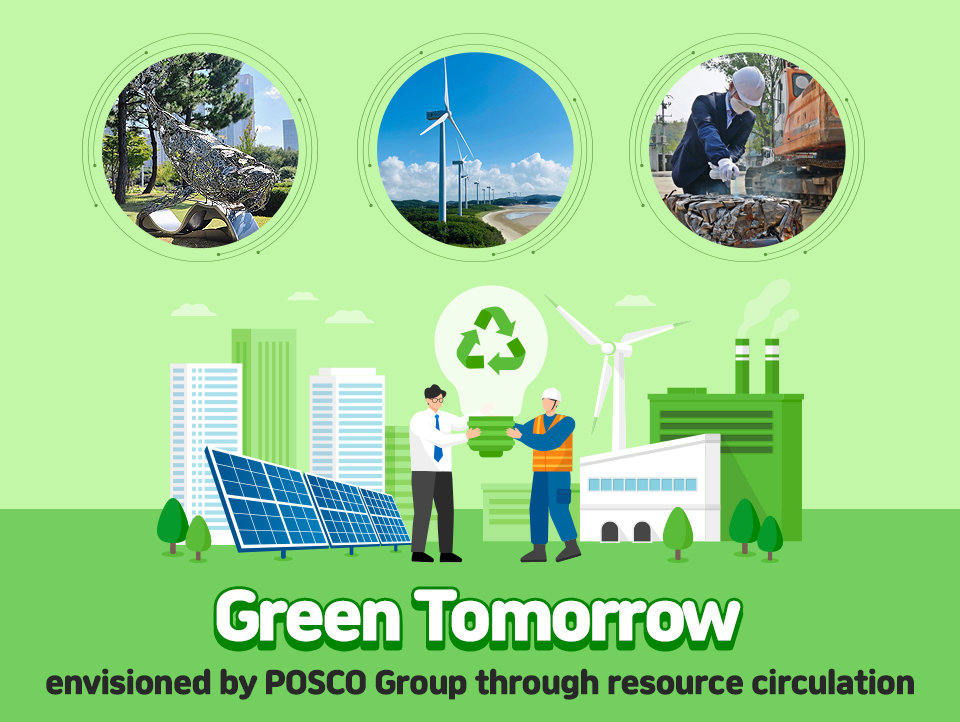
September 6 is Resource Circulation* Day. It was established by the Ministry of Environment and the Korea Waste Association to raise awareness of the importance of protecting the Earth’s environment and recycling resources. The date was chosen because the numbers 9 and 6 look the same when either is turned upside down, embodying the meaning of “recirculation.” The government has commemorated the date every year since 2009 to spread public awareness that waste is a precious resource and convey the importance of practicing circulation in our daily lives. In celebration of Resource Circulation Day, this article examines the journey for Green Tomorrow that POSCO Group is taking with resource circulation.
*Resource circulation: It refers to efforts to save resources by reducing waste, reusing or recovering waste that has already been generated, and disposing of waste that cannot be reused or recovered with minimal impact on the environment.
Since the appointment of Jeong-woo Choi as Chairman in 2018, POSCO Group has declared the corporate philosophy of “Corporate Citizenship: Building a Better Future Tomorrow” and has placed its social and environmental responsibilities as the top priority throughout management. Although corporate citizenship was still a relatively new management concept at its declaration, ESG management has emerged as a global trend. It is again attracting attention as the right path for future management. POSCO Group is leading in ESG management by being the first Asian steel company to announce a carbon neutrality plan in 2020 and the first global steel company to establish an organization dedicated to ESG. Moreover, we recognize environmental protection and resource circulation as important social values and lead in moving our society toward a sustainable transition and circular economy.
Climate crisis and the importance of environmental protection
Humankind has enjoyed a convenient and abundant life by producing and consuming a wide range of products. However, environmental pollution became a critical problem as the consumption of resources and energy grew, which increased the amount of discarded waste. Moreover, the polluted environment has caused abnormal climate phenomena such as global warming which poses an existential threat to human life.
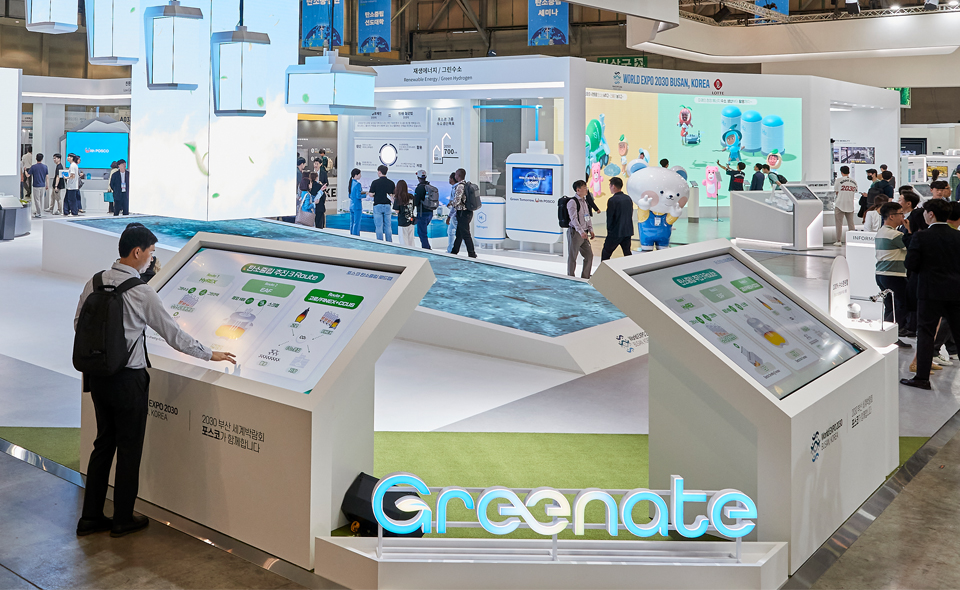
▲ Visitors to the 2023 World Climate Industry Expo are looking at POSCO’s Carbon Neutrality Roadmap.
Recognizing the climate crisis as an important management risk, POSCO Group is making efforts to respond to it, including ▲setting greenhouse gas reduction goals, ▲establishing an organization and management system, and ▲investing in environmental facilities. POSCO, in charge of steelmaking, the Group’s core business, has operated the Carbon Neutrality Committee as a control tower to guide the company toward “2050 Carbon Neutrality” since 2022. Other Group affiliates also have established a decision-making support system by operating an organization dedicated to carbon neutrality to establish the carbon neutrality roadmap and report risk factors related to climate change to the Board of Directors and top management of each affiliate.
Zero waste! Increasing energy efficiency and using renewable energy
POSCO International, in charge of the Group’s energy business, announced a plan to invest KRW 3.8 trillion for three years in line with the growth strategies of each sector in E&P (exploration and production), LNG (liquefied natural gas) infrastructure, power generation, and low-carbon energy beginning in 2023 when it merged with POSCO Energy. Based on the investment, it plans to complete the entire LNG value chain and continue to expand investment in environmental energy businesses such as new and renewable energy and hydrogen.
POSCO is focusing on improving energy efficiency in the steelmaking process. It recycles by-product gases generated during production to reuse them as fuel for processes or power plants, generating 81.6% of the electricity used at the steel mill. Moreover, it is minimizing by-product generation by increasing power generation efficiency through upgrading old and inefficient power generation facilities and developing the technology to predict the generation and use of by-products in real time.
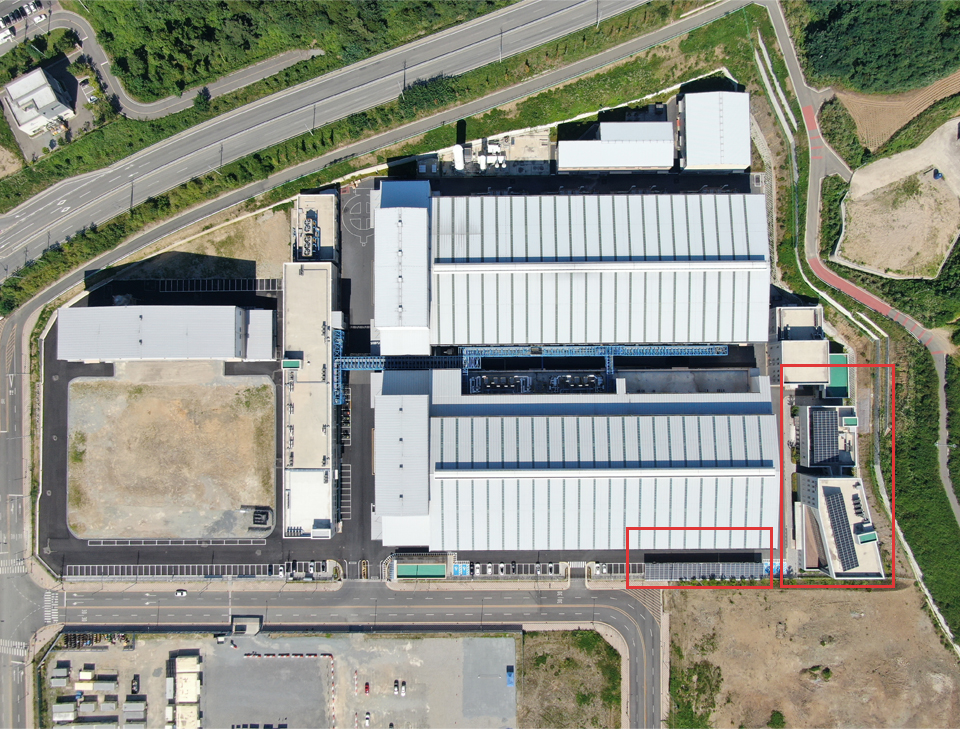
▲ Solar panels installed on the rooftop and parking lots of POSCO Future M’s Sejong Anode Material Plant
POSCO Future M is securing eco-friendliness of its businesses by recovering and reusing waste heat generated during operations and increasing the efficiency of production facilities. A leading example is the solar panels installed on rooftops and parking lots of its business site. The company expects to secure an annual power generation of 3,122 MWh.
Reusing water resources, even wastewater
Recognizing that managing water resources in its business sites is an important issue for sustainable management, POSCO Group is committed to reducing water shortage risks by optimizing water management and expanding recycling. Pohang works has reduced freshwater use by 80,000 tons daily using recycled water from sewage treatment since 2015, and Gwangyang Works replaced 30,000 tons of freshwater use daily with water produced by a seawater desalination facility opened in 2014.
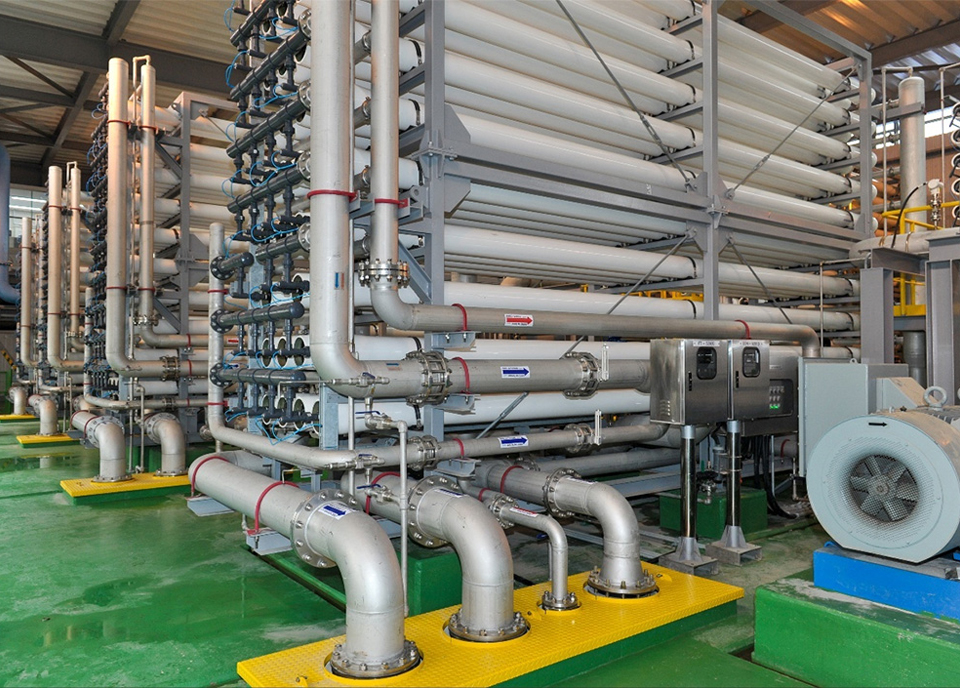
▲ Seawater desalination facilities with a daily production capacity of 30,000 tons operated by Gwangyang works
Last year, POSCO recycled 30% of the total water intake to lessen the local community’s water shortage risk. Furthermore, the company minimizes the generation of wastewater from its steel mills and recycles as much generated wastewater as possible. It discharges water that cannot be recycled through strict drainage treatment procedures or outsources the process to specialized companies.
New added values by converting by-products into resources and recycling
POSCO Group also operates recycling specializing subsidiaries such as PNR and POSCO HY Clean Metal in addition to minimizing discarded resources by converting by-products into resources and managing separate resource circulation goals.
POSCO was selected as a business site for Korea’s Resource Circulation Performance Management Program in 2018 and reuses more than 98% of by-products, such as slag, dust, and sludge, generated in steelmaking processes annually. The company generated 19,116,670 tons of waste last year and recycled 98.3%, excluding more than 300,000 tons that were incinerated and landfilled.
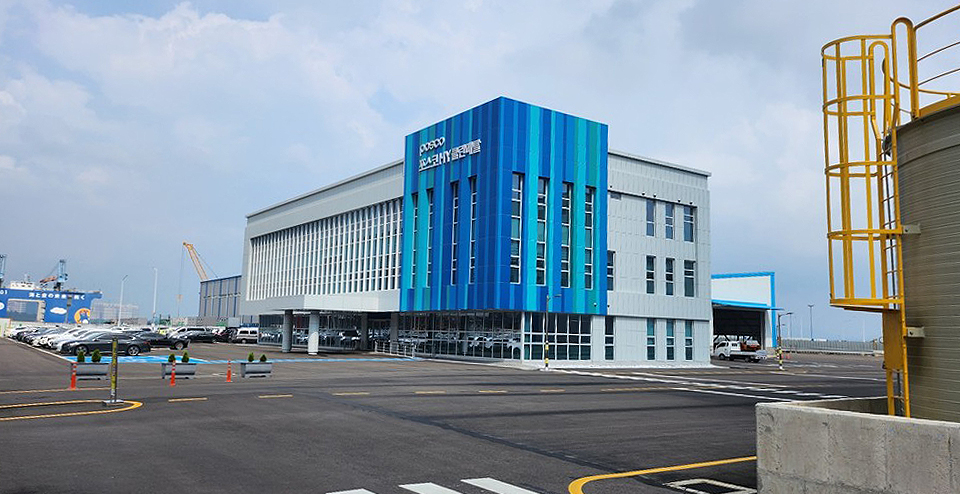
▲ View of POSCO HY Clean Metal’s secondary battery recycling plant
POSCO HY Clean Metal, located in Yulchon Industrial Complex in Jeollanam-do, conducts a resource recycling business that collects scraps and spent waste batteries generated by battery production and recovers valuable metals such as cobalt, nickel sulfate, and lithium hydroxide.
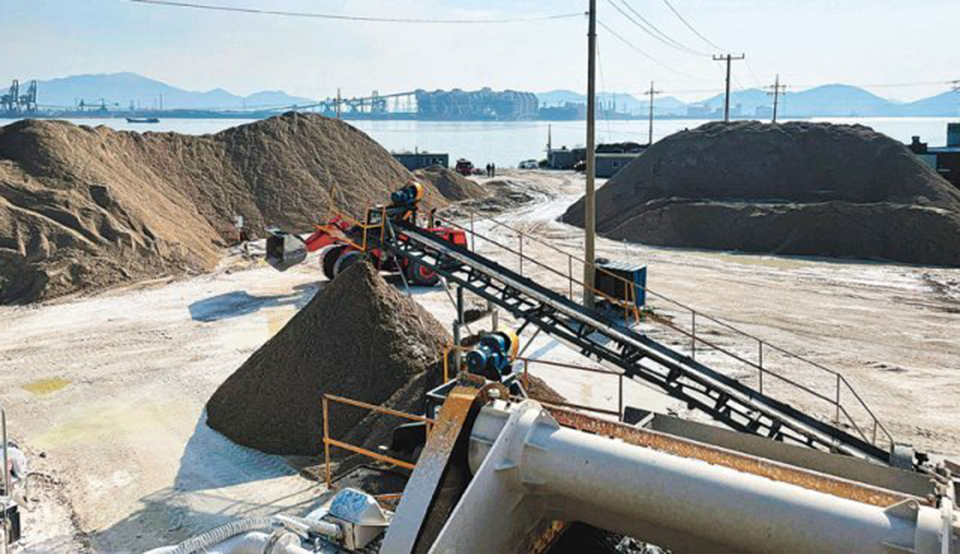
▲ Shell powder to be used in steelmaking is being unloaded at the loading dock of POSCO’s Gwangyang Steelworks in Gwangyang-si, Jeollanam-do.
Recognizing that limestone (CaO, 54%), the main component of shells, was similar to limestone (CaO, 51%) used in the steelmaking process, POSCO focused on converting shell powder into resources. Although there was no worldwide precedent of recycling shells as industrial resources, POSCO worked with suppliers, the government, and the local municipality to amend the related regulations and laws in 2021 to develop the technology to convert shells into limestone for sintering and quicklime for dehydration. It opened the way to process all 900,000 tons of abandoned waste shells and reduce 410,000 tons of carbon emission, making it an exemplary case of resource circulation.
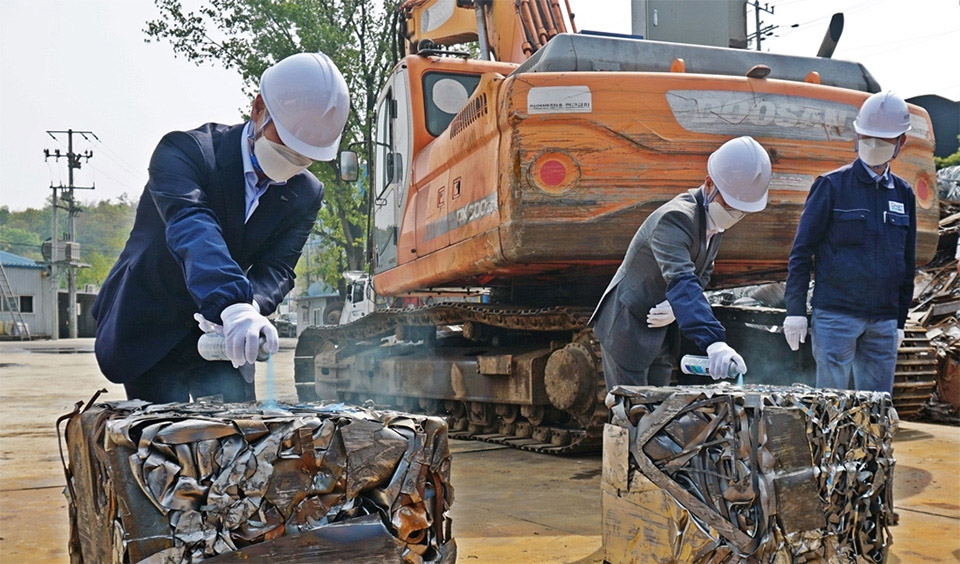
▲ POSCO International and POSCO officials are applying identification marks to products at the ceremony to sign the Agreement for Steel Scrap Collection.
POSCO International will work with small and medium-sized enterprises to invest KRW 20 billion by 2025 to construct steel scrap collection bases nationwide and establish a procurement system to supply 500,000 tons of steel scraps to POSCO annually. Steel scraps have attracted a great deal of attention as a realistic measure to achieve Carbon Reduction in the steel industry by reducing carbon dioxide emissions to 25% or less compared to traditional methods that rely on coal.

▲ PosMent (L), a low-carbon construction material that replaced lime with granulated blast-furnace slag, and an artificial reef using PosMent in POSCO’s sea forest creation project
POSCO E&C proactively reduces carbon emissions by applying PosMent, a low-carbon cement, developed from POSCO’s steel by-products to construction sites. PosMent is a sustainable construction material that reduces carbon generated in cement production by up to 60% by replacing lime (calcium carbonate, CaCO3), a main cement component, with granulated blast-furnace slag. The first field application began in 2013, and 200,000 tons in 2021 and 370,000 tons in 2022 were applied. The figure is expected to increase to 470,000 tons or 53% of total cement use.
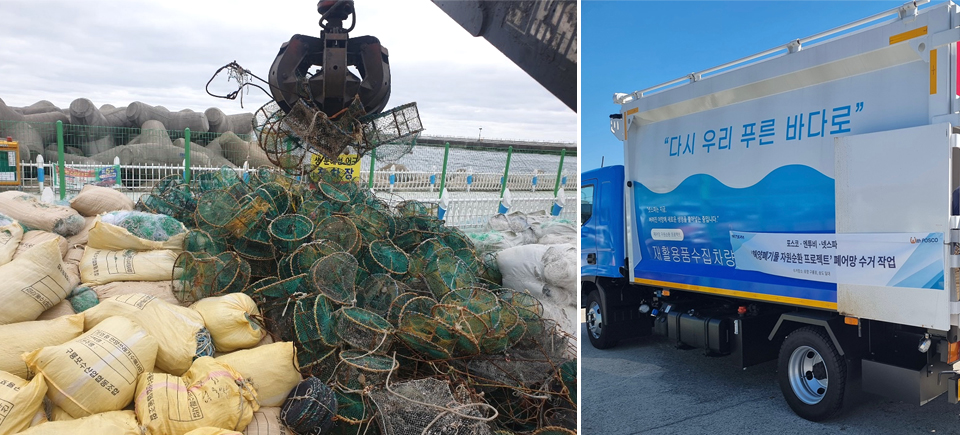
▲ Waste fishing net resource recycling project by eNtoB
eNtoB, POSCO Group’s maintenance, repair, and operating (MRO) materials procurement company, is carrying out a resource circulation project to develop sustainable products where waste fishing nets, which are marine waste, are collected and the recyclable nylon and plastic are extracted. On the 3rd of last month, it signed a recirculated resource supply contract with NETSPA, a recycling social venture company, and began full-scale commercialization.
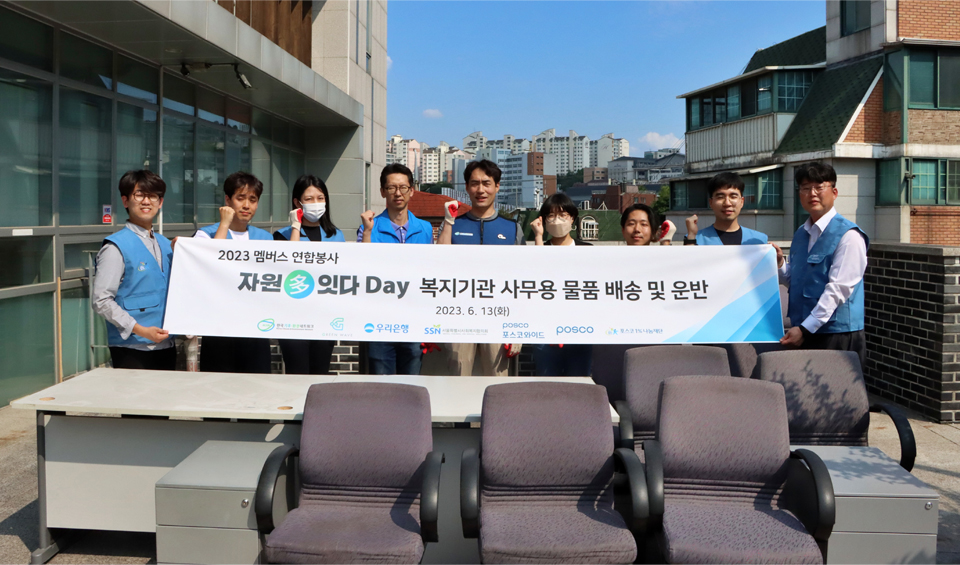
▲ POSCO Wide carries out community-sharing programs by transporting and delivering discarded office supplies to organizations and institutions in need.
Last year, the company opened a resource circulation platform called Jawon-Da-Itta (Resource Network) in a public service project to find and deliver office supplies to organizations and institutions that need them instead of discarding them. The project was recognized for its achievements in reducing carbon in everyday life and introduced as an excellent example of quantifying greenhouse gas reduction measures in the daily life sector at the Korean Pavilion of the Conference of the Parties to the United Nations Framework Convention on Climate Change (COP27) held in Sharm el Sheikh, Egypt, last year.
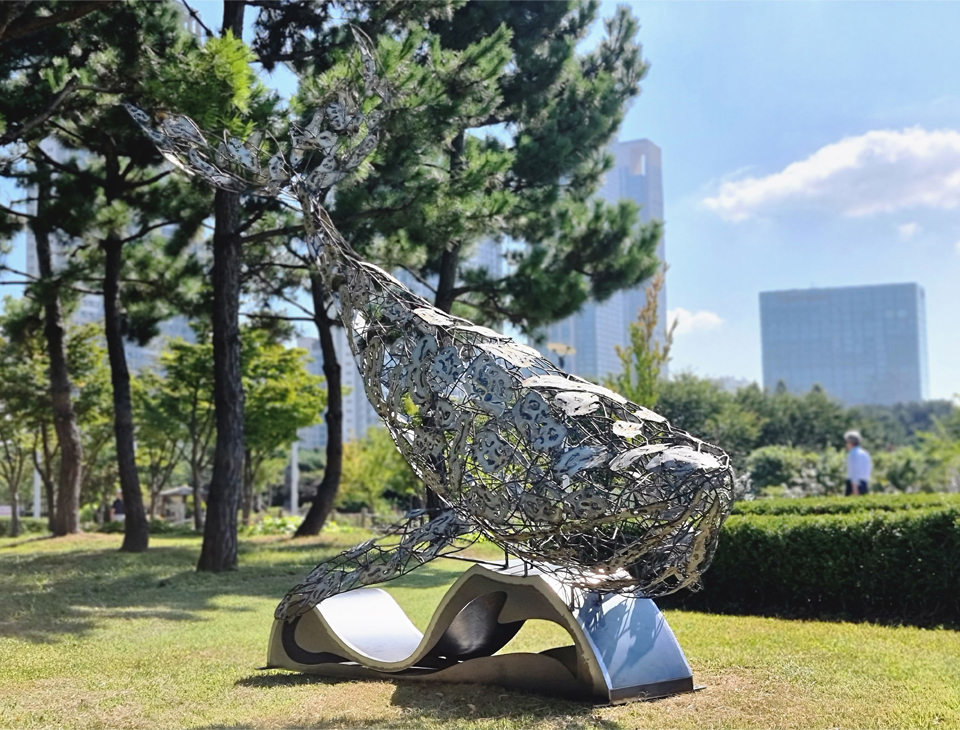
▲ POSCO E&C exhibiting public sculptures made from waste resources in 2022
POSCO E&C developed sustainable plates jointly with POSCO’s in-house venture, Iomtek, by combining waste plastic and slag powder, a by-product of steelmaking. It also held an exhibition of public sculptures made by upcycling scrap metal and machine parts left over from construction sites.
Moving on to a circular economy society beyond the linear economy
The linear economic growth model expressed as “make-consume-dispose” has enabled humanity to achieve rapid economic growth since the Industrial Revolution. However, it also caused other problems through wasted resources and continuous environmental destruction. Today’s circular economic model has emerged as the only alternative for sustainable growth. Its concept is to design the foundation considering recycling throughout the entire industrial process of “raw material-design-production-use” and promote efficient resource use and maximum circulation.
POSCO Group has recognized the transition to a circular economic society as an inevitable new paradigm and the key to achieving carbon neutrality by 2050 and is making plans to respond preemptively. In particular, in the secondary battery materials business, which has emerged as a new growth engine for POSCO and its century-long legacy, we will secure a stable supply chain that responds to the needs of environmental and social changes and build an industrial ecosystem where corporate growth and social value go hand-in-hand.
